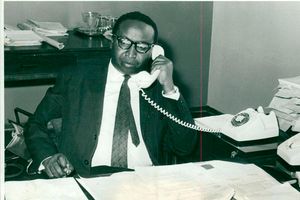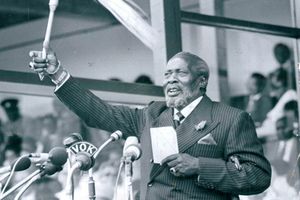
President Jomo Kenyatta is given a rousing welcome as he arrives in Mombasa to spend his Christmas holidays on December 23, 1967.
As internal self-government (Madaraka) became a possibility as the wind of Black nationalism swept across the continent, the main concern for Kanu top officials — Mzee Jomo Kenyatta and Jaramogi Oginga Odinga — was how to win the election, form the government and consolidate their political positions. To achieve this, they needed funds to fight the external threat posed by the Ronald Ngala-led Kadu and the internal challenge posed by the Tom Mboya faction within Kanu itself.
That is why when Mwalimu Julius Nyerere invited them to Tanganyika’s independence celebrations on December 9, 1961 as his special guests, the two used the opportunity to hold secret meetings with the Soviet and Chinese delegations to solicit for funds. In one recorded meeting in Dar-es-Salaam, Jaramogi told a top Chinese diplomat: “This is the time now to help Kenyatta. He is the leader of the party. What can you do to help us get the government? It is this time when we need to get assistance.”
They needed £50,000 from the Chinese and the same amount from the Soviet on the promise that they would help them set-up diplomatic missions in Nairobi if they took power. The Soviet were quite sympathetic and promised to look into the matter immediately they returned to Moscow.

Jomo Kenyatta is sworn in as Kenya’s Prime Minister on June 1, 1963 in Nairobi. Kenyatta wanted Jaramogi Oginga Odinga as his number two.
Ngala’s Kadu, which also included Daniel arap Moi as a key figure from smaller ethnic groups, posed a threat to the two in their bid for power because it was supported by wealthy European settlers in Kenya and the British government, who saw it as a moderate force. Internally, Kenyatta’s and Jaramogi’s grip on Kanu was threatened by Secretary General Tom Mboya, who held great sway in the party.
It is worth noting that Kanu was founded on the structures of Mboya’s Nairobi People’s Convention Party (NPCP), which was the best organised outfit in the colony from the time it was formed in 1958. When it was dissolved in 1960, alongside other district-based political parties, to pave way for the formation of Kanu, all its branches were integrated and branch officials became Kanu officials. And for some time, its headquarters served as the headquarters of the newly formed Kanu. Mboya’s tentacles, therefore, extended to every corner of the party.
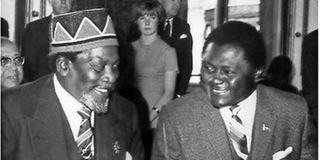
Mzee Jomo Kenyatta and Tom Mboya share a joke at the 1962 independence conference in London.
For these reasons, Kenyatta’s and Jaramogi’s strategy was to mount a well-oiled campaign to defeat Kadu while also reorganising Kanu by putting their allies in vantage positions to curtail Mboya’s influence.
In February 1962, Kenyan delegates from the rival Kanu and Kadu left for London to attend the second Lancaster Conference, which was to provide the road map for internal-self-government. According to a document by the MI5, the British intelligence, marked “for yours eyes only” and referenced PF786.389, before the delegates left for London, Kenyatta visited the American consular in Nairobi confronted him about supporting Mboya. The Consular replied that the American government was not propping up Mboya and that most of the funds he received came from workers’ unions, particularly the International Confederation of Free Trade Unions.
Meanwhile, Jaramogi, who was flying to Britain on a Ghanaian passport after the colonial government confiscated his Kenyan documents because of his many visits to the Soviet Union, made a stopover in Egypt where he held meetings with Chinese and Russian diplomats in Cairo and stressed the need for money, documents seen by the Weekly Review show. He then proceeded to London where he and Kenyatta booked the same hotel in Marble Arch just in the precinct of Hyde Park. What they didn’t know was that all their rooms had been bugged and listening devices connected to telephones in their rooms before their arrival.
When not attending the conference, the two spent most of their free time meeting Eastern diplomats to ask for money. However, after being warned about the danger of Communist by the Director General of MI5, Kenyatta feared that such meetings could antagonise the British and jeopardise his chances of ever leading Kenya. He, therefore, entrusted Jaramogi with handling all the contacts with the Soviet and the Chinese diplomats. In a telephone call he made to Jaramogi’s hotel room on February 16, 1962, he asked: “What about these people from the East have you got things fixed up?”
Jaramogi replied, “I am negotiating and have news, much news. We must talk about it.”
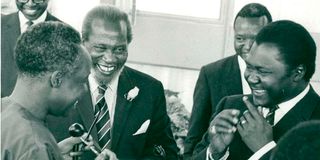
President Jomo Kenyatta, Tanzania President Julius Nyerere and Tom Mboya engage in a light banter at the Nairobi Airport on March 30, 1968. Tom Mboya was assassinated on July 5, 1969.
The only meeting Kenyatta had with the Eastern diplomats was on March 6, 1962, when Jaramogi brought some Chinese diplomats to him. During the conversation, Kenyatta was recorded telling the Chinese, “When Kenya gets its independence you are in. This is an opportunity for you to get an embassy in Nairobi.”
The following day March 7, 1962 Jaramogi met the Chinese diplomats alone and told them that their interests would be well catered for in Kenya because the plan was to make Kenyatta Prime Minister and him the Minister for Defence. But this could only happen if they gave them the £500,000 they had asked for in order to fight Kadu and to counter the Mboya faction in Kanu. He went on to reveal that Mboya had been given £100,000 by Israel and $57,000 by his friends in the US to consolidate his position in Kanu.
Jaramogi expressed his frustration to the Chinese by saying he was worried about delays in releasing the money. He went on to reveal that Kenyatta was equally not happy stating, “Jomo Kenyatta has been asking me, ‘you told me the Chinese were friends, where are we now, they are not moving anywhere’.”
The following day Jaramogi made a visit to the Soviet Embassy to discuss other issues and to remind them about the £500,000 they had also promised. He pleaded with the diplomat to get something settled that week because he didn’t know how long they were going to stay in London. Jaramogi emphasised that after the conference there would be a General Election in Kenya to usher in an internal self-government, and for that reason “we have to organise the masses and get all our candidates, all our key people, into position because we are fighting for our existence.”
Read: Mboya-Jaramogi war: In 1968 Tom complained of failed attempts to reconcile with opposition supremo
To entice the Soviets, he revealed that when he visited Tanganyika with Mzee Kenyatta to attend independence celebrations, the Tanganyikans were not interested in having a Soviet or a Chinese embassy but they were able to convince Julius Nyerere. “They did not want it at the beginning but now we are very lucky; we have got the Chinese there, “
He added. “Now in Nairobi, if we could get our people in, we shall get a balance of power. We get Soviet Union, we get People’s Republic of China, we get all the socialist countries — also the western countries there, then we can strike a balance of power.”
But despite Jaramogi trying to cajole him, the Soviet diplomat stated that their London embassy could not provide the money and pointed out such a huge sum of money could attract the attention of the British intelligence.
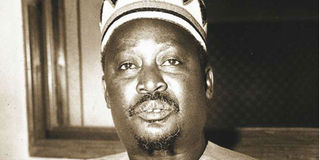
Kenya's first Vice President Jaramogi Oginga Odinga.
However, Jaramogi replied, “But you can do it in Egypt.”
He also suggested that the Soviet could send money in bits to Cairo, Geneva and London, where his agents would collect it: “Get on to Cairo, push it to Switzerland and then a small part of it to come here (London), then we can get on with the work immediately”. The Soviet diplomat agreed with the plan.
The Second Lancaster Conference ended with a constitutional roadmap for internal self-governance. Before that there was to be an election whose winner was to form the government. Meanwhile, the colonial secretary forced Kanu and Kadu into a coalition government, which was to operate until the General Election. The only downside was that the two coalition partners were strange bedfellows with Kadu supporting federalism (Majimbo) and Kanu centralism. The only way either of the two parties was to get out of this forced marriage of political expediency was to secure a decisive victory in the election and form a majority government.
With this in mind, the two parties followed somewhat divergent courses during the campaign; Kadu’s being subjective and defensive while Kanu rode on orthodox Pan-African realpolitik.
Jaramogi had secured £75,000 from the Soviets and another £20,000 through the Chinese embassy in Tanganyika to organise Kanu activities. Meanwhile, Kenyatta sent his agents with letters to leaders of newly independent African countries — notably Ghana, Morocco, Sudan and Egypt — requesting funds for Kanu campaigns. These countries sent him £160,000, with Ghana’s Kwame Nkrumah providing over half of it (£100,000). Mboya too had his part to play in financing Kanu’s bid, receiving £40,000 from his friends in the West.
However, these three leaders did not pool their resources in a common fund, but preferred to make periodic contributions while retaining the bulk of their funds to further their own political goals. In stark contrast with Kanu’s financial might, Kadu's resources were relatively modest, totalling £35,000. Apart from the local contribution, its external assistance came from industrial interests in Europe.
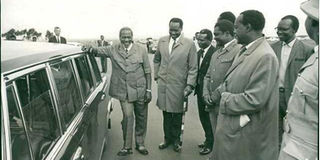
President Jomo Kenyatta in a cheerful mood with his Vice President Daniel arap Moi, Tom Mboya and Mr Charles Njonjo at the Nairobi Airport turn-off.
The period leading to the election saw an intense power struggle in Kanu. Even though there were official Kanu candidates in every constituency, Mboya and Jaramogi, in order to build their influence, were secretly sponsoring their own independent contestants.
On May 27,1963 as the results began trickling after the election. It was evident that Kanu had trounced Kadu and was on the verge of forming Kenya’s first African government. Kanu’s success was largely because of massive resources, Mboya’s exceptional organisational abilities, and nationalistic rhetoric that resonated well with the electorate.
With the results showing that Kanu was headed for victory with a huge majority against Kadu, the Governor of Kenya Sir Malcolm MacDonald invited Kenyatta to Government House (now State House) and asked him to form Kenya’s first internal government as prime minister. He was accompanied by Mboya and Jaramogi.
Kenyatta later retreated to a quiet hideout to select Kenyans who were to serve as ministers. He carefully balanced competence, ethnic considerations and the competing interests of Jaramogi and Mboya, who were lobbying for the appointment of their allies as ministers. The new Cabinet was unveiled on June 1, 1963 on the steps of Harambee House.
The writer is a London-based Kenyan journalist and researcher

